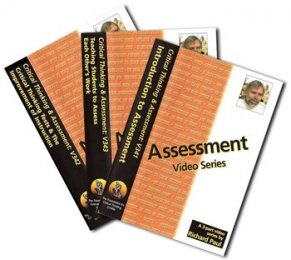
(Physical copies not available at this time.)
Author: Richard W. Paul
Publisher: Foundation for Critical Thinking
Number in series: 3 tapes/dvds
Length: 1 hour or more each
Format: VHS or DVD
Price: $69.95 for the series of 3 tapes/dvds
In the first video, viewers are introduced to the fundamental logic of all assessment: goals, facts, criteria, standards, reasoning, and application. An assessment checklist is developed. In the second video, the advantages and disadvantages of available critical thinking tests are presented and discussed. A case is made for the use of an essay test. Richard Paul demonstrates how a testing program can be coordinated with faculty development and programmatic assessment. In the third video, Dr. Paul explains and illustrates how to teach students to assess each other’s work. Questions are addressed in all three videos. Ample theory and application are provided throughout. See below for a detail on each tape in the series.